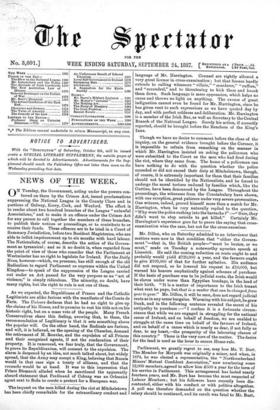Though we have no desire to comment before the close
of the inquiry, on the general evidence brought before the Coroner, it is impossible to refrain from remarking on the manner in which Mr. Harrington insisted on asking the policemen who were submitted to the Court as the men who had fired during the riot, where they came from. The home of a policeman can have nothing to do with the question whether the police exceeded or did not exceed their duty at Mitchelstown, though, of' course, it is extremely important for them that their families should not be identified by the Nationalists, and be forced to undergo the moral torture endured by families which, like the Cortina, have been denounced by the League. Throughout the proceedings, the witnesses from the Constabulary have shown, with one exception, great patience under very severe provocation. One witness, indeed, proved himself more than a match for Mr. Harrington, when he very naturally replied to the question,
" Why were the police rushing into the barracks P" Sure, they didn't want to stop outside to get killed." Certainly Mr. Harrington's experience goes far to prove the saying that cross- examination wins the case, but not for the cross-examiner.


































